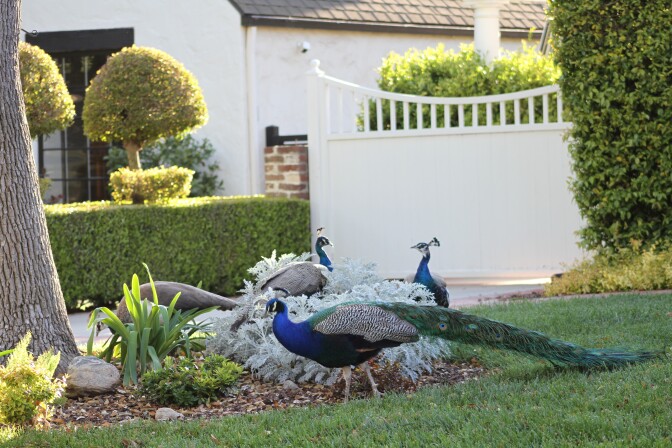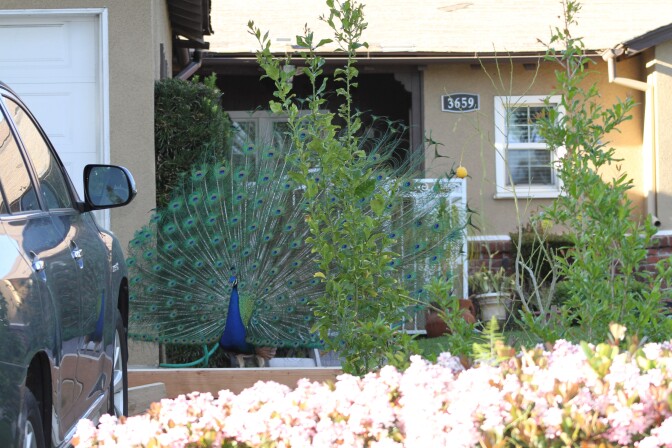This story is free to read because readers choose to support LAist. If you find value in independent local reporting, make a donation to power our newsroom today.
Rancho Palos Verdes has so many noisy peacocks that it's sending dozens to other parts of the state

Rancho Palos Verdes may not be able to stop the landslide that continues to pull entire neighborhoods apart, but when it comes to its burgeoning population of noisy peacocks, officials will soon be deploying a tried and tested solution: relocation.
Since last year, the city’s peafowl population has increased 31% to 215 birds, prompting city leaders this week to approve plans to “humanely trap” and relocate some of them to maintain the population at around 134.

The birds will be taken to farms and ranches in San Diego County, Ventura County, Bakersfield, Palmdale and Fresno, said Jonathan Gonzalez, president of Raptor Events, the company tasked with capturing and moving the birds.
In 2015, Rancho Palos Verdes officials adopted a "peafowl management plan" in response to residents’ complaints about noisy calls, excessive animal waste and damage to private property.

How are the birds trapped?
During the annual peafowl census, the birds are counted at sunset as they roost in trees. Then depending on the population, city leaders approve how many will be relocated. This year, the City Council voted to trap 34 birds in Portuguese Bend, 20 birds in Vista Grande and 15 in Sunnyside Ridge.
“ The birds walk into the trap — they usually don't know how to get out — and we pick up on the same day to ensure a humane, safe removal,” Gonzalez said. “Then the birds are eventually transported to farms and ranches safely.”
Corn, nuts and seeds are used to lure the birds into the 10-foot-by-10-foot cages, and once inside, he said, they’re “relatively calm.”
“ They know that they're caught. They don't want to draw attention to themselves,” Gonzalez said. “Any natural bird behavior is to not draw attention to yourself, typically, because that means you could be inviting predators. In their mind, if they're flapping around and jumping around, they could be inviting a tiger to look for them.”

Once the birds are captured, they’re taken to a holding facility.
“ We watch them, observe them for about two weeks before they can get transported to their new homes,” he said. “We just want to ensure that there's no disease, no sick birds, no injured birds before they go to their new homes.”

Peacocks on the peninsula
The birds are not native to the area. They're commonly found in countries close to the equator, including India and Sri Lanka.
According to the city, the birds were introduced to the peninsula in the Portuguese Bend area as a gift from William Wrigley Jr.’s daughter to Frank Vanderlip Sr., one of Rancho Palos Verdes’ early developers.
The birds have also found homes in other parts of the city, including Vista Grande, Crestridge and Sunnyside Ridge.











